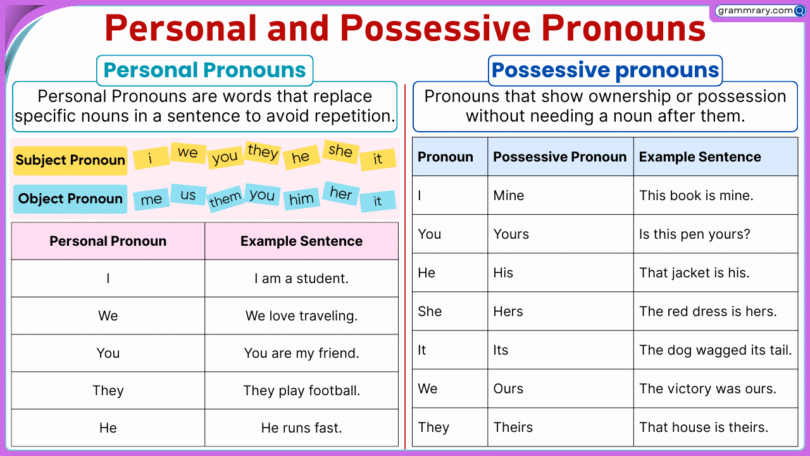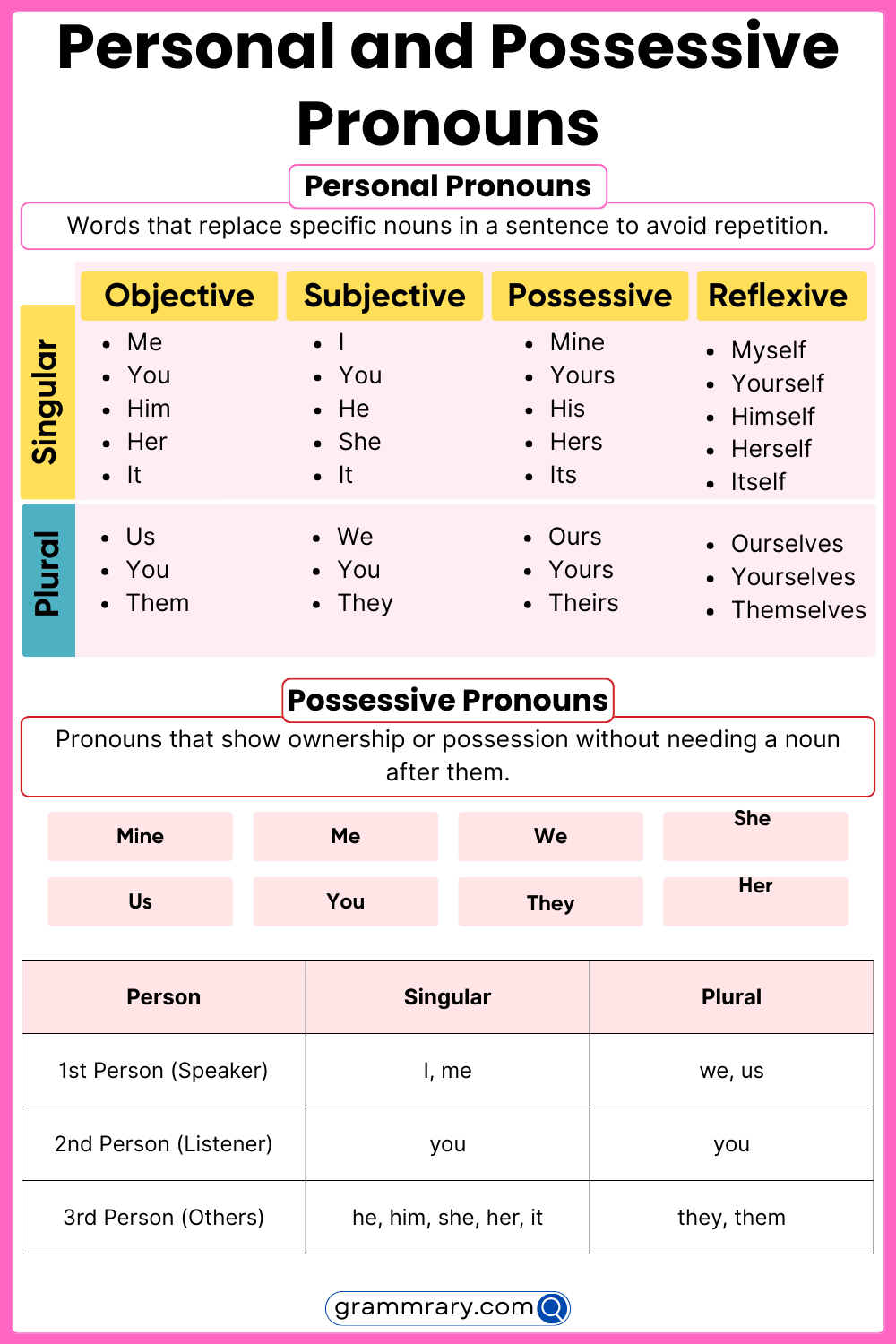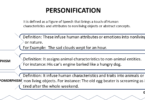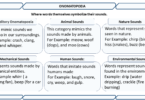What Are Personal Pronouns?
- Person (first, second, or third)
- Number (singular or plural)
- Gender (masculine, feminine, neuter)
- Case (subject or object)
Types of Personal Pronouns
- Subject Pronouns – Used as the subject of a sentence.
- Object Pronouns – Used as the object of a verb or preposition.
Subject Pronouns
| Person | Singular | Plural |
|---|---|---|
| First | I | We |
| Second | You | You |
| Third | He, She, It | They |
Examples:
- She is reading a book.
- They went to the market.
Object Pronouns
| Person | Singular | Plural |
|---|---|---|
| First | Me | Us |
| Second | You | You |
| Third | Him, Her, It | Them |
Examples:
- John called me yesterday.
- The teacher gave them homework.
What Are Possessive Pronouns?
Types of Possessive Pronouns
| Person | Singular | Plural |
|---|---|---|
| First | Mine | Ours |
| Second | Yours | Yours |
| Third | His, Hers, Its | Theirs |
Examples:
- This book is mine.
- The blue car is theirs.
Difference Between Possessive Pronouns and Possessive Adjectives
Many learners confuse possessive pronouns with possessive adjectives. Here’s how they differ:
| Type | Example (Adjective) | Example (Pronoun) |
|---|---|---|
| First Person | My book is new. | The book is mine. |
| Second Person | Your bag is heavy. | The bag is yours. |
| Third Person | His phone is broken. | The phone is his. |
Key Rule:
- Possessive adjectives always come before a noun (my car).
- Possessive pronouns stand alone (the car is mine).
Advanced Usage of Pronouns
1. Reflexive Pronouns
These pronouns refer back to the subject (e.g., myself, yourself).
- She hurt herself.
- They did the work themselves.
2. Demonstrative Pronouns
Point to specific things (this, that, these, those).
- This is my pen.
- Those are her shoes.
3. Relative Pronouns
Introduce relative clauses (who, whom, whose, which, that).
- The girl who won the prize is my friend.
- The book that you gave me is interesting.
Personal Pronouns and Possessive Pronouns Example Sentences
| Personal Pronoun Sentence | Possessive Pronoun Sentence |
|---|---|
| I love this book. | This book is mine. |
| You write very well. | This pen is yours. |
| He runs every morning. | That bag is his. |
| She sings beautifully. | The dress is hers. |
| It looks so nice. | The idea was its. |
| We play football daily. | The house is ours. |
| They study together. | The books are theirs. |
| Me help him often. | That key is mine. |
| Him call me every day. | This phone is his. |
| Her invite us to lunch. | The seat is hers. |
| Us support each other. | The car is ours. |
| Them visit the park. | The tickets are theirs. |
| Myself talk to the manager. | This idea is mine. |
| Yourself enjoy the party. | The responsibility is yours. |
| Himself finish the work. | The mistake was his. |
| Herself clean the room. | The diary is hers. |
| Itself move slowly. | The cover is its. |
| Ourselves help the team. | The plan is ours. |
| Yourselves handle the situation. | The idea is yours. |
| Themselves decide the date. | The prize is theirs. |
| Who call you yesterday? | This coat is mine. |
| Whom see you at the mall? | The money is yours. |
| This belong to me. | The house is his. |
| That seem perfect. | The jacket is hers. |
| These help a lot. | The shoes are ours. |
| Those need cleaning. | The garden is theirs. |
| Someone knock at the door. | The passport is mine. |
| Anyone want coffee? | The ticket is yours. |
| Everyone arrive early. | The bike is his. |
| Nobody know the answer. | The phone is hers. |
List of Personal Pronouns and Possessive Pronouns
Personal Pronouns in English
I
You
He
She
It
We
They
Me
Him
Her
Us
Them
Myself
Yourself
Himself
Herself
Itself
Ourselves
Yourselves
Themselves
Who
Whom
This
That
These
Those
Someone
Anyone
Everyone
Nobody
List of 30 Possessive Pronouns in English
Mine
Yours
His
Hers
Its
Ours
Theirs
My
Your
His
Her
Its
Our
Their
Whose
One’s
Anybody’s
Somebody’s
Nobody’s
Everyone’s
Each’s
Neither’s
Either’s
Whichever’s
Whatever’s
Whoever’s
Theirs (singular usage)
Hers (formal usage)
Ours (plural usage)
Yours (plural usage)
Common Mistakes to Avoid
- Using subject pronouns instead of object pronouns:
❌ Me and John went to the park.
✅ John and I went to the park. - Confusing its (possessive) with it’s (contraction of it is):
❌ The dog wagged it’s tail.
✅ The dog wagged its tail. - Incorrect reflexive pronoun usage:
❌ He did it hisself.
✅ He did it himself.
Final Thoughts
Understanding personal pronouns and possessive pronouns is crucial for clear communication in English. By mastering their types and correct usage, ESL learners can improve their grammar and avoid common mistakes.
Pro Tip: Practice by replacing nouns with pronouns in sentences and identifying possessive forms in daily conversations.
Do you have any questions about pronouns? Let us know in the comments!
Learn more helpful articles









